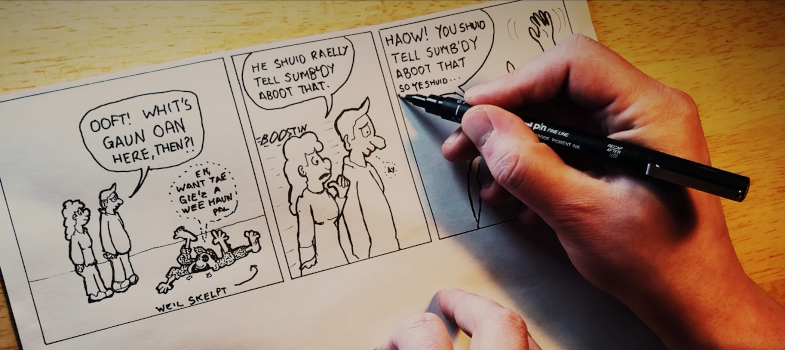Introduction to Scots language debates
Scots – Fae up the toun tae doon intae lochs an soonds

1. Introduction to the Scots language debates
This unit by Sylvia Warnecke is particularly valuable for those teachers who are new to the discussions around Scots language in education. Those teachers who have already engaged with this topic, might want to skim this unit and only study the aspects they find useful.
Scots is one of the four so called home languages spoken/used in Scotland, alongside English, British Sign Language and Scottish Gaelic. Sots and Gaelic are indigenous languages to Scotland. Scots is recognised as a language in its own right by the Council of Europe's European Charter for Regional or Minority Languages, the European convention for the protection and promotion of languages used by traditional minorities. The UK Government, and the Scottish Government through ratifying the charter in 2001, therefore recognise Scots as a language in its own right. To realise the vision expressed in the charter, the Scottish Government published its Scots Language Policy in 2015, together with Education Scotland.
As opposed to English and Gaelic, Scots is a non-standard language. This means that it does not have a written standard and has less ‘institutional support or sanction [compared to] a standard language. Like any dialect/language however, it has its own vocabulary and an internally consistent grammar and syntax; and it [is] spoken using […] a variety of accents’; as a non-standard language, Scots ‘has historically been stigmatised, and a debate continues about the extent to which non-standard [use of Scots] should be encouraged, and even simply tolerated, [e.g.] in education’ (What is the difference between standard and non-standard languages? Pal, 2018).
When exploring this debate, you will become aware that the story of Scots can be told in two versions: the official history of Scots as told through policy changes, and the lived experiences of Scots-speaking people.
Despite differing points of view, Scots remains an essential part of Scotland, its history, culture and identity. In accordance with this, the Scots Language Policy outlines the reasons why it is important to engage with and promote this language:
Scots is an essential element of the culture and heritage of Scotland. For many of us, it is a familiar aspect of our song, poetry and literature and a recognised feature of how we express ourselves in our community life. The Scots language is only spoken within Scotland and it is not used anywhere else in the world by a community of significant number or extent. Therefore steps need to be taken within Scotland to ensure its preservation.
The Scottish Government will promote and support Scots, and encourage its respect and recognition in order that, what for many is the language of the home, can be used in other areas of Scottish life. (https://www.gov.scot/publications/scots-language-policy-english/, 2015)
In the latest policy development around Scots in Scotland, the Scottish Government proposed a bill dedicated to the two indigenous languages of Scotland, Gaelic and Scots. The Scottish Languages Bill was introduced to the Scottish Parliament in November 2023, following an extensive process of consultation. You can read the Scots Language Centre's response to the consultation here and explore aspects the Scots community wanted to highlight for consideration for the Scottish Languages Bill.
The Government are currently seeking input from experts with suggestions on any amendments to the proposed Bill before debating it in Parliament and eventually passing this Bill and making it law. Once the Bill is passed, Scots will for the first time have an official status in Scotland, which has implications on the role/status of Scots language in education, for example.
The key learning points of this short unit are:
to learn about the role and use of Scots language in Scotland today
to find out about the position of Scots language in the history of Scottish education
to evaluate attitudes towards Scots language in your immediate context
to work towards a definition of Scots as a language in its own right
